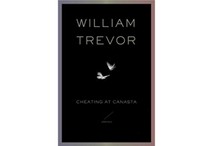Cheating at Canasta
By William Trevor
240 pages;
Viking
The short story as a form is difficult to master and powerful in effect—like a well-strung bow. William Trevor, who has been at it for many decades, is unquestionably a master, one of three or four writing in English in the last century (V.S. Pritchett, William Maxwell, Alice Munro) whom one might compare profitably to the 19th-century figures who invented and then perfected the form: Chekhov, Maupassant, James. The title story in his new book, Cheating at Canasta (Viking), finds an older man eating alone at Harry's Bar in Venice. He'd promised his wife as she slid into the darkness of Alzheimer's that he would return to this old haunt of theirs. As a lone gentleman, for the first time without her, he is no longer recognized. He is plagued with thoughts of his wife's decline, of their earlier travels, of what she might have said at any moment in this meal. Yet somehow a younger, newly married couple intrudes on his consciousness; they are at odds, and he perceives instantly the waste they are making of their youth and their love. It is a typical Trevor story, minutely observed, operating flawlessly, layered, quiet, and, like all great short stories, inevitable. Trevor's attention has turned in this latest collection to matters of regret and loss, but the energy of erotic desire and dangerous transgressions—sin, as it once was richly understood in his native Ireland—still charges his world, running like a hot current under the surface of every human interaction.
— Vince Passaro


